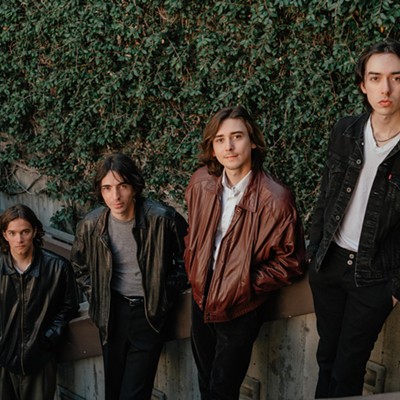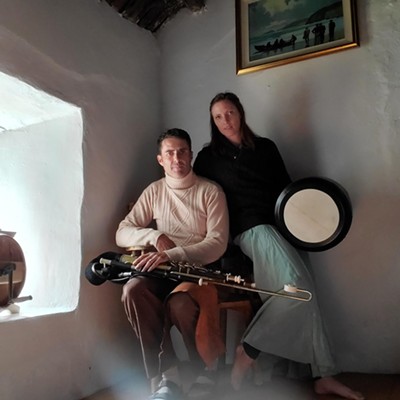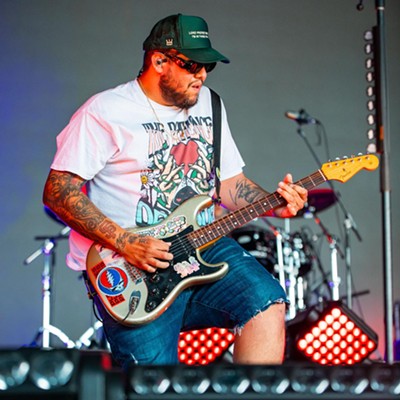In 2015, Kamasi Washington emerged from Los Angeles with an increasingly rare thing: a breakthrough jazz album. Following a 2014 Nielsen year-end report declaring "jazz the least-popular genre in the US," the saxophonist managed a heroic feat, turning on young fans to cosmic jazz, igniting stalwarts, and in an age of streaming singles, garnering fawning attention for a three-volume, nearly three-hour album.
Though it was the saxophonist's debut, The Epic carried significantly more weight than the average introductory statement. Steeped in spiritual jazz traditions of John and Alice Coltrane and Pharoah Sanders, the funky fusion of Donald Byrd and Wayne Shorter, and the free jazz explorations of Ornette Coleman, it rang out like a declaration.
Culled from hours of sessions, most from 2011, the album represented Washington's life work. It found Washington stepping forward as a bandleader, after years of session work, which found him playing with everyone from Ryan Adams to Snoop Dogg, and documented the rise of the West Coast jazz vanguard. Washington's relationship to most of the players on the album, including electric bassist Thundercat and drummers Tony Austin and Ronald Bruner, stretched back to their youth. With its sweeping vocal choirs and sprawling scope, The Epic showcased a group honed by years. A debut, sure, but one by a seasoned, deft group rooted in experience and capable of a fiery delivery purely of the moment.
Released by the Brainfeeder label, the Los Angeles label headed by composer Flying Lotus and best known for electronic music and hip-hop, the record reached audiences new to jazz, landing on Billboard charts and debuting as the No. 1 jazz album on iTunes. Washington and his band The Next Step became a staple on festival bills, appearing not only at the Monterey Jazz Festival, but also jazz-sparse gatherings like Coachella. Alongside emerging forces like keyboardist Robert Glasper, trumpeter Christian Scott aTundeAdjuah, and bassist Esperanza Spalding, Washington became a chief figure cited by those arguing for jazz as a thriving, radically evolving art form.
"It's a little surreal," Washington says from Los Angeles, where he's prepping for the tour, which brings him to the Tucson Jazz Festival, of the accolades that followed his debut, which include winning the inaugural American Music Prize, rewarding the best debut album by an American artist with a $25,000 payout.
"I've been playing this music so long and then this happened so fast," Washington says. "It's an honor. It's good to be able to have a voice in that conversation, you know?"
On stage, toweringly tall with an Afro, dashiki and tenor sax, Washington blows with an elemental intensity. But in conversation he's quiet, given to thoughtful pauses. Because 2015 was his year, the 35-year-old still seems to be processing exactly what that means at the start of 2017. In addition to The Epic's success, 2015 found him contributing to Kendrick Lamar's To Pimp a Butterfly, the finest hip-hop album of the decade, featuring avant-garde jazz textures provided by Washington, Glasper, trumpeter Ambrose Akinmusire, producer and jazz musician Terrace Martin and others. The one-two punch served as Washington's break.
This year, he's followed it with a steady stream of work, contributing to Martin's lush Velvet Portraits LP, the jazz punk fury of Throttle Elevator Music's IV, Carlos Niño's spacemusic album Flutes, Echoes, It's All Happening! and the third album by clanging rap duo Run the Jewels. Washington's continued work on the follow-up to The Epic, which he promises will sound "different," and is chipping away at a graphic novel inspired by the dream that helped inspire the thematic construct of his debut. But mostly, he's played live. The Next Step's been in demand, and their time touring in support of the album has proved an influence on Washington's musical direction.
"Most of the music on The Epic was recorded in 2011, so we've all evolved and changed," Washington says. "As much as we had played together when we were younger, these last two years, we've gotten even closer. We've been playing more in these last two years than we've probably played since we were in high school."
Like most of his band mates, Washington's a second-generation jazz musician, introduced to the music by his father Rickey Washington, whose sax he picked up at 13. In high school, he formed his first group, The Young Jazz Giants—note early evidence of Washington's playful tendency to self-mythologize—with Ronald Bruner and Stephen "Thundercat" Bruner, the sons of Ronald Bruner Sr., who drummed with the Supremes, the Temptations and others. His connection to jazz tradition was deeply ingrained by his upbringing and education.
"You make clothes, music, movies, anything—there's a tie to what people before you did," Washington says. "Human advancement is based on the understanding of what came before you. You stand on the platform that was built before you, and build your own platform, which someone else will stand on. I always feel that."
But Washington has little use for lines dividing music. After all, he learned his craft playing alongside Snoop Dogg and Lauryn Hill as well as Herbie Hancock, Billy Higgins, and George Duke. The distinctions between genres blur easily in Washington's head.
"I feel like jazz, hip-hop, R&B, rock 'n' roll, they all have been intertwined since their invention," Washington says. "They had this intertwined history. It's something that musicians know and acknowledge, but not necessarily the general public. But I played in Snoop's band and his whole band was jazz musicians; James Brown, everyone in his band was a jazz musician, basically. That reality has always been there. It's not that they aren't different, they are, but they're definitely intertwined. They're not separate."
Appearing on PBS's Charlie Rose in May, 2016, Washington described jazz as a "telescope," and other forms of music as a "microscope." His metaphoric understanding of jazz as limitless, utterly free music is what draws Washington to it. It's what draws him to all the music he loves, like Lamar's To Pimp a Butterfly, a record that seems to evoke the creative potential of jazz as a mindset, not only a structural form.
"A lot of hip-hop records have subtly [integrated jazz's] complexity, rhythms, chords, and feel," Washington says. "But Kendrick kind of pushed it to the forefront of his music, which I think opened the door in music. For a long time there's been this notion that people don't like music with depth and complexity, they're not able to understand it, it's beyond them. I've never agreed with that. Kendrick really dispelled that myth. He made a record that was extremely popular, that was loved all over the world, not just by intellectual musicians. It was just people who loved music...it reached people."
Washington says that To Pimp a Butterfly's success helped people discover The Epic, and that its influence will likely extend far beyond that.
"Young musicians coming out today, because of that record, they don't have that same fear, that idea that they have to dumb down their music for people to like it," Washington says. "That idea is dissipating. That's a huge thing. To Pimp a Butterfly...kicked the door open for all of us. You can even put out a record that's three-hours long. It let us all know the world was ready for musicians to be able to fully express themselves."
Washington cites Solange's avant-soul album A Seat at the Table as an example of the kind of work that's flourished in that album's wake. Alongside records like Chance the Rapper's gospel-influenced Coloring Book, Beyoncé's Lemonade, which grafts blues and country to bounce, pop and hip-hop, Tortoise guitarist Jeff Parker's jazz-funk stunner The New Breed, and classicist rappers A Tribe Called Quest's knotty (prog-rap?) comeback We got it from Here...Thank You 4 Your Service, The Epic feels tied to a movement in black art that places a premium not only on evolving traditional forms, but on utilizing them as means for kaleidoscopic expressions of identity. You may hear Washington's influences in his impassioned playing, but you hear them channeled through his singular lens. While some may pin hopes for jazz's continued relevance or historical pedigree on him, the matter's far more personal than that to the saxophonist.
"I feel like music is a means of self-expression that connects you to other people," Washington says. "What I focus on in my music is trying to reach inside of myself and pull something inside of me out. In that, part of who I am is based on what I learned from other people. As you live, people inspire you and those inspirations and experiences turn into 'you.' Those things are inside of you. I'm really trying to just hear the melodies in my head, and form them into something that can reach other people."
With The Next Step backing him up, Washington aims to achieve the goal of absolute expression each time he takes the stage. To pull up and show his inner self, alongside lifelong friends and collaborators. To make truly "free" music.
"We have so much freedom when we play with each other," Washington says. "There's no boundaries. Nothing's off limits. Nothing's out of reach."







